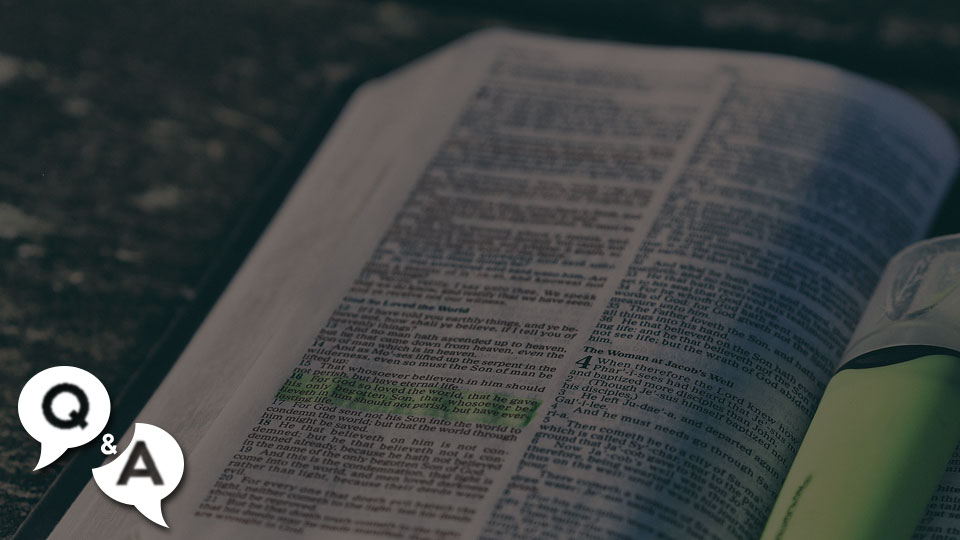August 11, 2019 • Nineteenth Sunday in Ordinary Time
First Reading: Wisdom 18:6–9
Psalm: Psalm 33:1, 12, 18–19, 20–22 (12b)
Second Reading: Hebrews 11:1–2, 8–19
Gospel Acclamation: Matthew 24:42a, 44
Gospel: Luke 12:32–48
This Sunday’s readings are about having a forward-looking, active, living and saving faith in God and His promises. The liturgy begins with the following cry, based on Psalm 73:
Look to your covenant, O Lord,
and forget not the life of your poor ones for ever.
Arise, O God, and defend your cause,
and forget not the cries of those who seek you.
First Reading
The First Reading comes from the Book of Wisdom. It looks back into Israel’s history, to the first Passover, when each household of the people of Israel was preparing for the sacrifice of an unblemished lamb, in order to paint its blood on the lintel and doorpost of the house. God had ordered them to do this to save their first born from the final, deadly plague that was about to strike the Egyptians and force Pharaoh, the supreme ruler of the land, to allow their departure from slavery in the land of Egypt, so that they could return to the land that God had promised to their fathers, Abraham, Isaac and Jacob, hundreds of years before. The Israelites ate the roasted meat of this sacrifice that night, along with unleavened bread and bitter herbs, in a state of readiness to leave at a moment’s notice. God had instructed them, through Moses, that this was what they must do. And as the passage from Wisdom notes, they did so with the sure knowledge of the divine oaths in which they put their faith.
If they didn’t believe, they wouldn’t have made all these preparations, their first born would have died along with those of the Egyptians, and they would have remained as slaves of the Egyptians. The faith that saves listens to God, trusts in His promises and performs the actions necessary for each individual’s salvation. It’s that simple.
The Israelites also put into effect the divine institution of the Passover which would, over time, become the Eucharist, the divine institution in which the Lamb of God who takes away the sins of the world would become man, to be sacrificed for our salvation, delivering us from our slavery to darkness, sin and death and bringing us into His glorious kingdom of light and the bliss of heaven. We, as Christians living in this world, have embarked on our own exodus to the Father’s house, where Jesus is preparing a place for each of us.
The Responsorial Psalm is an exhortation and prayer to keep our hope, trust, praise and thanksgiving focused on God, who has chosen us for deliverance and salvation as His own inheritance.
Second Reading
We now move on to the Book of Hebrews, which recalls the forward-looking active, living faith of Abraham and the other Old Testament saints. These saints acknowledged themselves to be strangers and aliens on earth, because they desired a better homeland — a heavenly one. “Therefore God is not ashamed to be called their God, for He has prepared a city for them.”
Abraham trusted God so much that he was willing to place the son of the promise, his beloved son Isaac, on the altar and give him back to God, trusting in God’s resurrection power and faithfulness.
Gospel
The reading from the Gospel according to Luke records a conversation between Jesus and His disciples. In it, Jesus exhorts his disciples to be constantly ready for His return. Being ready meant not only to be desiring and watching for His return, but also to be about their Master’s business. As His chosen apostles, they would be put in charge of their Master’s affairs and serve as stewards of His other servants, to distribute the food allowance at the proper time. The apostles would be those who would know their Master’s will. Their punishment for not being ready and not being about their Master business will be much more severe than the punishment for the servants in their charge, who have a lesser knowledge of their Master’s will.
So the question is, Do we have this kind of focused, active, living and saving faith? What is it that God wants us to be doing? We certainly need to pray for those whom God has placed in charge over us as stewards of the household of God and we do that when we gather together to celebrate and participate in the one sacrifice of the Mass, the divine institution of the Eucharist. We also need to be faithful in our several callings. We need to see ourselves as strangers and aliens on earth, or as the old Gospel hymn goes, “This world is not my home, I’m just a-passing through.” Are we traveling light? Are we forward looking, ready to depart? Do we really want to see God and live with Him forever? Then keep this holy writ in mind:
“Much will be required of the person entrusted with much, and still more will be demanded of the person entrusted with more.”







